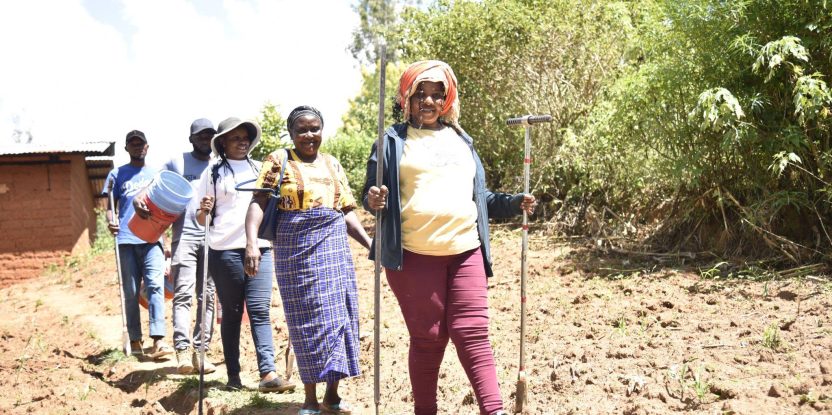
Globally, land degradation and climate change are significant drivers of human insecurity, impacting over 1.3 billion people living on degraded agricultural land. In Kenya, addressing forest and landscape degradation is a pressing challenge, exacerbated by deforestation, intense land-use competition, overgrazing and climate change. The country’s forests are depleting at an alarming rate, with an annual loss of approximately 5,000 hectares.
Restoring degraded landscapes and ecosystems has emerged as a critical nature-based solution for addressing climate change at local, national, regional and global levels. In Kenya, Makueni and Taita-Taveta counties, both located in arid and semi-arid regions, have become focal points in the battle against degradation. The concept of forest and landscape restoration (FLR) provides an integrated, nature-based approach that promises to enhance biodiversity, ecosystem services, productivity and the well-being of communities.
In response to the urgent need for action, the Center for International Forestry Research and World Agroforestry (CIFOR-ICRAF), in partnership with the Food and Agriculture Organization (FAO) and the African Wildlife Foundation (AWF), are implementing the domestication of Forest and Landscape Restoration Implementation Action Plan (FOLAREP) 2024-2032 in Makueni and Taita Taveta Counties governance level. FOLAREP is a key tool in implementing Kenya’s National Landscape and Ecosystem Restoration Strategy. It is expected to help the country meet its commitments to both the Bonn Challenge and the AFR100 target of restoring 5.1 million hectares of deforested and degraded lands by 2030. This ambitious blueprint addresses the policies and complex ecological challenges facing both counties. The FOLAREP domestication process is funded by the UK PACT Nature-based Solution Project, which supports countries with emissions reduction potential through increased capacity building.
Developing the FOLAREP at the county level in Taita Taveta and Makueni Counties
Taita Taveta and Makueni counties present a potential for forest and landscape restoration. The success of the efforts to restore landscapes, including forests, rangelands, croplands, riparian, grassland, roadsides and urban lands, requires the delivery of nature-based solution outcomes and addressing institutional policy gaps. Through implementing and monitoring interventions, these areas can serve as examples with evidence-based recommendations.
To initiate the domestication of FOLAREP at the county level, technical working groups were constituted in November 2023. These groups comprise a diverse range of stakeholders in restoration, including national agencies and county extension services. The development process has since progressed through a series of participatory, comprehensive and collaborative engagements, ensuring that all involved parties’ inputs, needs and aspirations were represented and included.
A key milestone in the implementation process was the recent two-part workshop in Taita Taveta County held from 23-27 September 2024, where the County Executive Committee and County Assembly were sensitized ahead of the endorsement and adoption of the plan. These workshops provided an opportunity for consultative engagement with the Taita Taveta County Executive Committee, which approved the plan, paving the way for the next stage of the roadmap. This was followed by discussions with members of the County Assembly. The members of the County Assembly approved the plan. The approved plan was edited and is a typeset for printing, after which the governor will sign and launch it later this year.

Taita-Taveta Governor, Deputy Governor and County Executive Committee Members during the review and approval of the FOLAREP plan at Voi Wild Life Lodge. Photo by Ann Wavinya / CIFOR-ICRAF
The goal of the Taita-Taveta FOLAREP is to restore 226,420 hectares of degraded landscapes having restoration potential using integrated FLR techniques, hence accelerating Kenya’s national objectives of restoring 10.6 billion hectares of degraded landscapes by 2032.
In his opening remarks, Governor Andrew Mwadime expressed his strong support for the initiative. “As county leader, I have consistently emphasized that our equitable share, given our large land and small population, falls short of adequately supporting essential services,” said Mwadime. “Therefore, I deeply value our esteemed partners and friends’ support.”
Meanwhile, in Makueni County, which aims to restore 200,000 hectares of landscape, the domestication of FOLAREP has already undergone most of the formulation stages, adapting the national plan to the local context. The plan is now being typeset for printing before being signed and officially launched by the governor.
Acknowledgements
UK PACT (Partnering for Accelerated Climate Transitions) is a unique capacity-building programme. Jointly governed and funded by the UK Government’s Foreign, Commonwealth and Development Office (FCDO) and the Department for Energy Security and Net Zero (DESNZ) through the UK’s International Climate Finance, it works in partnership with countries with high emissions reduction potential to support them to implement and increase their ambitions for tackling climate change.
We want you to share Forests News content, which is licensed under Creative Commons Attribution-NonCommercial-ShareAlike 4.0 International (CC BY-NC-SA 4.0). This means you are free to redistribute our material for non-commercial purposes. All we ask is that you give Forests News appropriate credit and link to the original Forests News content, indicate if changes were made, and distribute your contributions under the same Creative Commons license. You must notify Forests News if you repost, reprint or reuse our materials by contacting forestsnews@cifor-icraf.org.